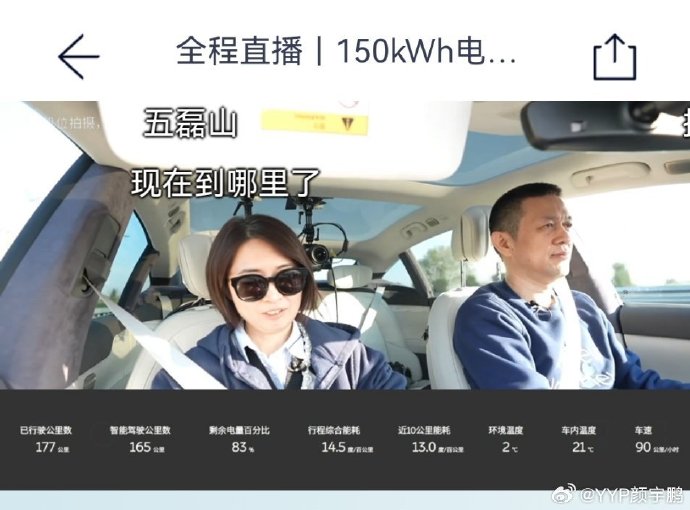We have a few more solid- or semi-solid-state batteries to share in this round of encouraging battery news. We start with an overview by Dave Borlace that includes a few batteries discussed in last week’s entry, and some interesting takes on three more makers.
WeLion/NIO and Must See TV
Setting a 650 mile record on a single charge, the NIO ET7 managed altitude, temperature, and distance. “The 14-hour journey from Shanghai to Xiamen breaks barriers, despite cold temperatures (starting off in 28° F (-2°C), proving the electric vehicle’s remarkable capabilities.” Going that far on a single charge is an appreciable accomplishment. Critics cite the 150 kilowatt-hour battery as being half-again as energy-packed as most EVs pack, but the relatively light weight of the pack allows the additional energy to be carried. William Li, NIO’s CEO and Chairman, set the car on “the NOP+ semi-autonomous driving system activated for 92% of the journey. The average speed was 83.9 km/h (52.13 mph),” as reported by the blog MOVOCars.rent. (Remember that the total time included rest breaks.)
Viewers who managed to binge watch would be forgiven for cat-napping during the long drive. The 260 Watt-hours per kilogram pack level energy density is roughly equal to a Tesla, but the small weight increase adds enough energy to drive that record distance.
Best of all, perhaps, is that the car’s WeLion batteries are being mass produced and delivered. Electrek reports, “Five days into April, NIO is celebrating mass production of the semi-solid-state batteries as promised.”
ProLogium
ProLogium Technology, a partnership between Taiwanese and French interests, opened what they claim as the “world’s first giga-level solid-state lithium ceramic battery factory in Dunkirk, France.” Other facilities in Taiwan will act as development facilities and production outlets.
The company inaugurated its Taoke, Taiwan factory in late January with leaders from government and industry attending, including a French delegation from Dunkirk. Key strategic partners, including Mercedes-Benz, POSCO (a South Korean steel maker), FEV (a car component maker and consultant), Arkema (a chemical supplier), and banks from Taiwan and France were also present.
Prominently on display, a 106Amp-hour solid-state battery with a high-silicon anode is designed for electric vehicles and made in the Taoke facility, which acts as a demonstration factory. Looking to the future, ProLogium showed off the latest batteries, and what will come in the future. Their video below has a rather startling comparison between their cells and more conventional lithium-ion batteries at the 21-second mark.
Vincent Yang, founder and CEO of ProLogium was enthusiastic. “After 17 years of dedicated effort, ProLogium is thrilled to present next-generation solid-state batteries to the world. The Time is Now. Our journey has been a testament to overcoming existing technological barriers and innovating new structures, leading to a fundamental transformation in cell structure and process design… Looking ahead, ProLogium is set to globally promote the achievements of the Taoke factory, propelling the industrialization of solid-state batteries and supporting global automakers and governments in their quest for net-zero emissions.”
Their PCR batteries, representing “Performance,” “Cost,” and “Resource Circulation,” could become a regular part of EVs in the near future, even beyond Asian brands.
HPB – High Performance Batteries
Renewable Energy magazine credits the high conductivity of the HPB to its novel solid-state electrolyte, which, like WeLion’s seems capable of working well at a wide range of temperatures.
“Conductivity: Compared to the liquid electrolytes commonly used today, the HPB solid-state electrolyte has an enormously improved conductivity. This is decisive for the available power from the battery cell. The HPB solid-state electrolyte shows an absolutely higher conductivity at minus 40 °C than conventional liquid electrolytes at their optimum at plus 60 °C. These properties have been confirmed by independent partners and research institutes in the temperature range from minus 40 °C to plus 60 °C.” The new solid-state electrolyte is also claimed to be non-flammable.
Based in Bonn, Germany, High Performance Battery (HPB), a startup specializing in the research and development of high-tech batteries, seems poised to make what they claim as the world’s first solid-state battery ready for series production. The company will be using a licensing model for the technology to allow rapid market introduction in many applications and global regions
CEO Sebastian Heinz plans big. “We are already holding intensive talks not only in Germany and Europe – in India, too, people are very open to implementing our technology. In Switzerland, a gigafactory is already being planned that will cover the Swiss market and produce for further licensees.” With ProLogium’s French equivalent in Dunkirk, Europe should soon be a highly productive area for solid-state energy storage.
A major selling point for HPB may be its great durability. “Conventional lithium-ion batteries have to be replaced after about 1,250 charging cycles – with hourly charging and discharging,” according to HPB. HPBs solid-state battery can sustain “at least 12,500 charging cycles with a comparable load.” Lower uses of raw materials with easy access to primary materials worldwide enable widespread production.
Applications for the HPB solid-state battery range from stationary storage for home and industrial use to charging infrastructures and the mobility segment, such as the automotive industry. Or, for future aircraft applications.
Next Up
We’ve done three entries so far on solid-state batteries, and will conclude this series with a fourth about Toyota’s return to promoting their long-promised addition to that species.

